"OCIMF is a collaborative organisation, whose sole purpose is to improve the safety and environmental performance of tankers, terminals and offshore supply vessels."
Director's Log

This Director’s Log has, in the past, mentioned the power of working together; as Aristotle said “The whole is greater than the sum of its parts”.
A great example of working together is currently on show at the International Maritime Organization (IMO), where they have an exhibition showing the progress on improving tanker performance and oil spill response over the last 50 years. The exhibition gives a timeline showing significant milestones in improving tanker performance: changes in regulation; significant industry publications; establishment of compensation regimes, etc. The inclusion of OCIMF’s Ship Inspection Report Programme (SIRE) and the International Safety Guide for Oil Tankers and Terminals (ISGOTT) are a reflection of the organisation’s contribution.
OCIMF worked together with the International Chamber of Shipping (ICS) and the International Association of Ports and Harbors (IAPH) to produce ISGOTT, which remains the primary authoritative document on the safe operation of oil tankers and terminals. Of course, we cannot be complacent. OCIMF and INTERTANKO met at the beginning of March to discuss SIRE, to talk about how we can make sure it continues to be fit for purpose.
Another great example of working together is the Best Management Practices for Protection against Somalia Based Piracy publication. 18 industry representatives collaborated on this guidance for ship’s masters, which is supported by governments and navies and can be found on the bridge of ships, in offices and embedded in contracts throughout the shipping industry. That shows the true power of collaboration.
OCIMF is a collaborative organisation, whose sole purpose is to improve the safety and environmental performance of tankers, terminals and offshore supply vessels. We look forward to working together to make our industry safer.
Stay safe,

Andrew Cassels
Director OCIMF
Do you have news that you'd like to share with our readers? If so email
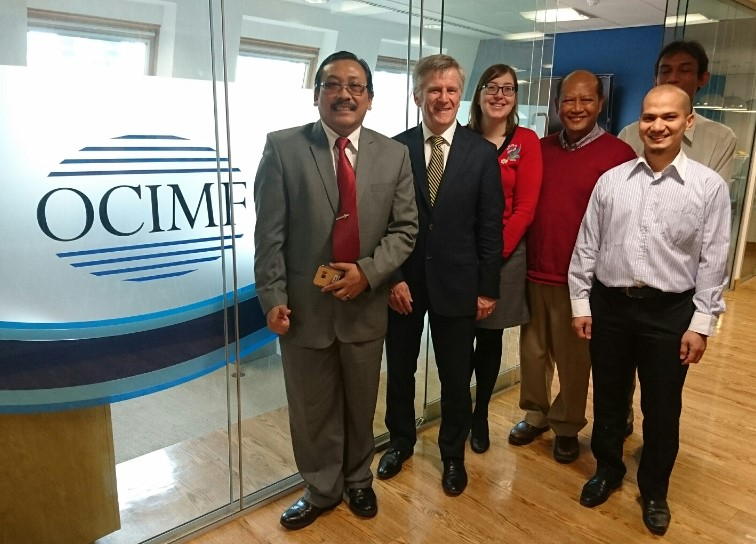
Prof. Dr Bambang Prasetya, Mr I Nyoman Supriatna and Mr Donny Purnomo Januardhi, Center from National Standardization Agency of Indonesia (BSN) and Mr Muhdar Tasrief, PT. (Persero) Biro Klasifikasi Indonesia met with OCIMF’s Andrew Cassels and Kelly Hadley to discuss the range of guidance, recommendations and best practices published by OCIMF.
Ship to Ship Focus Group
The Ship to Ship Focus Group (STSFG) held its 8th meeting 14–16 February in Houston, USA.
OCIMF member representatives and invited industry representatives from STS service providers and hose manufacturers attended. The group discussed the development of the Guidelines for the Handling, Storage, Inspection and Testing of STS Hoses in the Field, which will be released as an information paper. They also shared current issues affecting the STS industry and lessons learned from recent incidents.
The last day and a half was limited to OCIMF member representatives only. This group reviewed the minutes from the previous STSFG meeting and feedback from the Ports and Terminals Committee (PTC). They also worked on the revision of the STS Service Provider Self Assessment section of Ship to Ship Service Provider Management
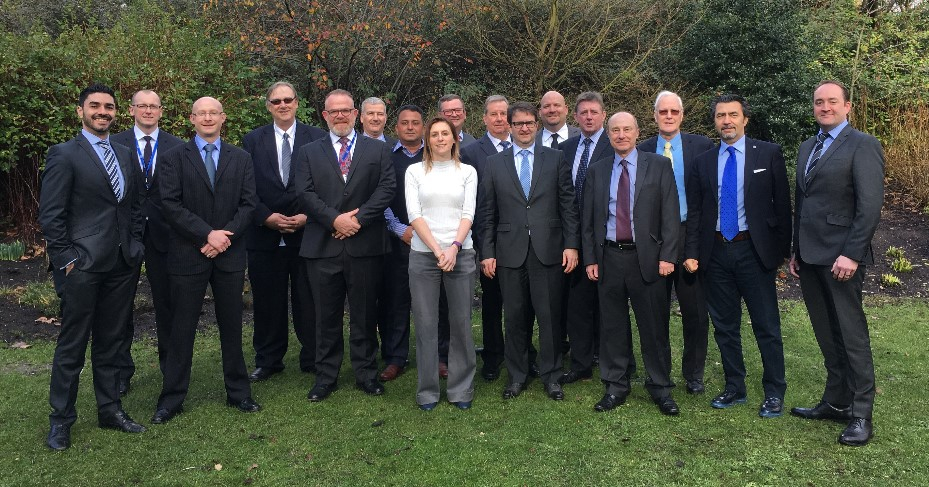
Marine Terminal Focus Group. From left to right: Fabiano Dias (OCIMF); Tomasz Pniewski (Chevron); Jim Perkin-Ball (MIS); Geoff Snow (MIS/OCIMF); Andy Bickerdike (Chevron); Rob Drysdale (OCIMF); Arun Rampal (Caltex); Samantha Jewkes (MIS); Luke Fisher (BP); Tony Pollock (INEOS); Eric Berger (Total); Derek Thompson (P66); Tony Caldwell (IMT); Clive Hurford (Shell); Charles Stuart (NuStar); Salvatore Bianca (ENI); Dominic McKnight Hardy (MIS).
North America Inland and Coastal Barging Focus Group
The meeting was hosted in Houston by Phillips 66, 7–8 February.
This was the 11th meeting of the North America Inland and Coastal Barging Focus Group (NAICBFG). Ten members were represented. The meeting covered a wide range of agenda items, including:
- SIRE data mining for regional barge information.
- Barge Particulars Questionnaire: future revisions and update.
- Barge Inspection Questionnaire guidance.
- Review of CAT3 training material, new registration portal in SIRE and planning for the refresher and new inspector training (4–6 April 2017).
- SIRE US barge inspections and inspector issues.
- Review of Regional Auditing Inspector CAT 3 training guidelines.
- Performing a gap analysis of SIRE to make sure it aligns with US Coast Guard Subchapter M regulations when they come into force.
- Acceptance of revised terms of reference approved by SIRE Focus Group.
- NAICBFG voted yes to encouraging submitting members to use SIRE automatically generated Inspection Booking Codes.
Members also discussed wider matters involving North American barge inspections and operational safety matters.
Other members of the Phillips 66 marine staff stopped by during the meeting for brief discussions and introductions, including John DeRose, Global Manager, Marine Risk-Assurance; Arthur Sequeira, Director, Vetting & Audit (Americas) and Thomas Farrington from the HSE department.
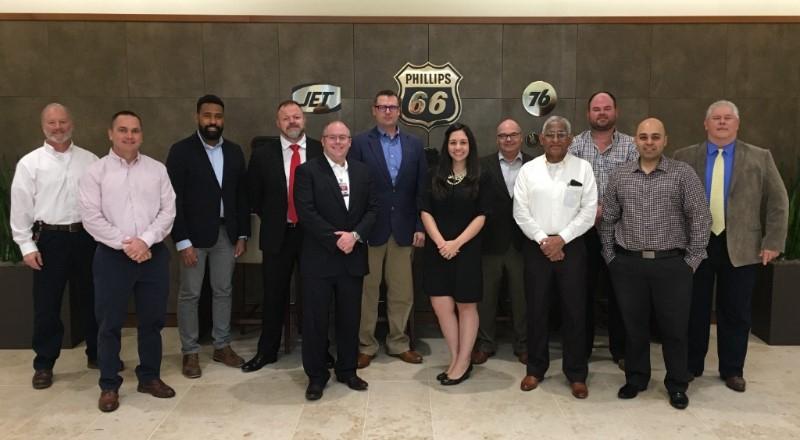
The North America Inland and Coastal Barging Focus Group. From left to right: Ron Waddell (Phillips 66); Shawn Roberts (Martin Midstream Partners); Kenneth Romney (BP); Patrick McGroggan Secretary (OCIMF); Joe Francis (Valero); Daniel Hughey, Chair (Sea River Maritime/ExxonMobil); Ashlee Gatusso (TESORO); Mike Nesbitt (Sunoco Logistic); Rakesh Bajaj (Marathon); John Dees (Shell); Rajeev Saini (Chevron); Steve Carr (Nustar).

Ship Design and Construction sub-committee © IMO
News from the IMO
The Ship Design and Construction (SDC) sub-committee held its fourth meeting on 13–17 February.
The main points were dedicated to passenger ships and detailed naval architecture issues. Nevertheless, there were several points of interest to OCIMF members.
Carriage of more than 12 industrial personnel
Following the non-mandatory resolution on this issue at the Maritime Safety Committee (MSC) 97 (MSC.418(97)), which provided an interim solution only, the sub-committee started discussions on the agreed long-term mandatory solution. This is likely to result in a new chapter 15 in SOLAS, which will need to align with other related codes, e.g. the OSV Code, OSV Chemical Code, SPS Code and HSS Codes. The sub-committee agreed to form a correspondence group to start work on a proposal for SOLAS amendments and the supporting mandatory code.
Guidelines for safe mooring for all ships
Following discussions on mooring design at MSC 95 and SDC 3, a correspondence group was formed to work on:
- Amendments to SOLAS, i.e. a few bullets on high-level mandatory requirements.
- Guidelines to support the SOLAS amendments, i.e. the detail of what to do.
This work was scheduled to be finished in 2017 but several papers, including one from OCIMF, showed that significant further work was needed. The group have received support for this further work and a terms of reference for the group was approved at SDC 4. The group are expected to report to SDC 5 in Spring 2018.
Even keel hydrostatics for Deadweight (DWT) calculation
A lively debate ensued on the use of even keel hydrostatics or trimmed hydrostatics for calculations involving DWT. The Longitudinal Centre of Flotation (LCF) may be aft of the load line marks and it is therefore theoretically possible to trim a vessel aft and load more cargo without submerging the load line mark. It was agreed:
- DWT shown on certificates would be the even keel calculated DWT.
- It is not acceptable for loading and stability information to include a loading condition with a DWT that exceeds the even keel DWT (this reversed the decision from SDC 3).
OCIMF members at the IMO
OCIMF members had the opportunity to visit the '50 years working together' exhibition at the IMO last month, while attending the Human Element, Training and Watchkeeping (HTW4) sub-committee.
The exhibition was supported by OCIMF and is open until July. Members interested in seeing the exhibition should contact 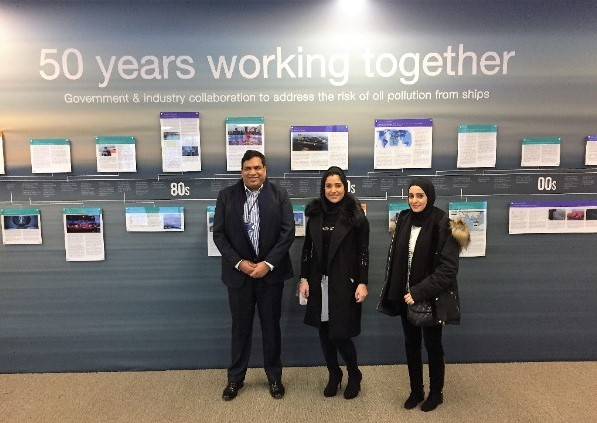
Maritime Security Snippets
New US Maritime Advisory System
The United States Marine Administration (MARAD) recently issued a maritime advisory announcing the launch of a new US Maritime Advisory System. According to the advisory, this is the most significant update to the US government process for issuing maritime security alerts and advisories since 1939.
For more information, visit www.marad.dot.gov/environment-and-safety/office-of-security/msci/.
Cyber Security: Smart, Safe Shipping
OCIMF supported the production of the DVD Cyber Security: Smart, Safe Shipping, by Steamship Mutual Underwriting Association Ltd. Cyber risks can affect all aspects of maritime operations, not just shore-based operations, and this DVD provides a good overview of the issues owners and operators need to consider. and the importance of the human element to combat the cyber threat.
More information can be found on www.steamshipmutual.com.
TMSA software update
Each OCIMF programme has its own version of a management self-assessment tool.
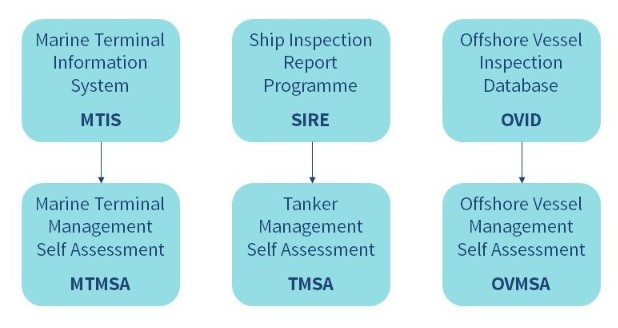
However, until recently the TMSA software application has existed outside of the SIRE application. This has meant that vessel operators have needed to use two different sets of credentials in two different systems to manage their vessels and their company’s TMSA. As part of the overall review of TMSA, and in preparation for the release of TMSA3 later this year, OCIMF have integrated TMSA into the SIRE application. From 1 February, all updates to the TMSA document must be carried out using the SIRE application; vessel operators have been notified and the www.ocimf-tmsa.org website has been redirected to www.ocimf.org/sire .
For any enquiries, please contact OCIMF at
More news on the publication and release of TMSA3 will appear in future newsletters.
